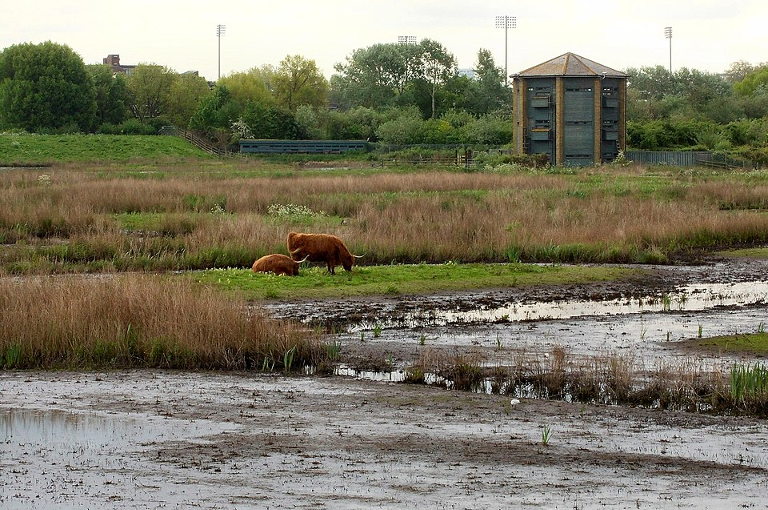Our planet is at a tipping point. Climate change threatens all our futures if we do not act now. All sectors must look at their impact, and agriculture is no exception. Agriculture is currently responsible for up to one quarter of all emissions globally. Current industrial farming practices are major contributors to escalating climate change and nature loss – this must urgently be addressed.
But farming is also unique. Not only could it reduce emissions through more sustainable practices, it also has the potential to remove carbon from the atmosphere and become perhaps the biggest nature-based solution to climate change. In addition, sustainable farming can restore nature and deliver healthy food from resilient food systems. These issues – climate, nature and health – are interlinked and should not be treated in silos.
So why is food and farming not on the agenda of COP26? As talks begin in Glasgow, there is a risk that governments could be missing a major opportunity.
“Agriculture could play a central role as part of the solution to climate change, not only by reducing emissions but by sequestering carbon in the soil. Yet, at present, the scale and importance of this potential seems to have gone largely unrecognised by global leaders. In order to harness the potential of agriculture to address climate change, we need a global farm metric that measures our impacts, we need trade agreements that are conditional on sustainability and we need to acknowledge the role of soil and grassland as a major carbon sink.” Patrick Holden, Chief Executive of the Sustainable Food Trust.
We believe the following three issues are key to harnessing the power of agriculture as a solution to climate change:
1. Global Farm Metric
For farmers to become agents for positive change they need a clear on-farm measurement framework and a strong business case for change. We know you can’t manage what you can’t measure, which is why we have been working with a coalition of over 50 organisations [1] to develop the Global Farm Metric (GFM) – a whole-farm framework that aligns existing sustainability assessments.
The GFM can be applied to all farming systems and drives action by providing:
- Farmers with a practical measurement framework to drive a transition to more sustainable farming practice.
- Governments a baseline of relevant data to monitor progress towards climate goals and reward farmers through farm aid payments for delivering positive environmental, social and economic outcomes.
- Food companies, supermarkets and financial institutions the information to determine what food they buy, who they lend to and where they invest.
- Consumers with the clarity on what food they buy and how to use their purchasing power to drive change.
Crucially, the GFM measures a range of sustainability indicators – from carbon, water and soil to health and social impacts. Almost all major companies, organisations and a growing number of governments now have a strategy for reaching net zero. However, the temptation to pursue a single goal in isolation, such as reducing GHG emissions, could lead to negative consequences in other pillars of a sustainable system, such as biodiversity gain, water and societal health. To tackle climate change globally, we need to recognise the interconnection between nature and food production. The GFM takes a holistic approach, establishing all key indicators of sustainability that can be applied on farms across the world.
2. Soil is central to our climate strategy
Soils are the world’s biggest terrestrial carbon store, containing more carbon than is found in the atmosphere and all of the world’s vegetation combined. But ongoing mismanagement of our soils through intensive crop production with chemical fertilisers and pesticides is resulting in a disastrous loss of carbon into the atmosphere.
By returning to regenerative mixed farming, with fertility-building grass and legumes integrated with crop rotations, we have the opportunity to improve soil health and store significant quantities of carbon. For this reason, farming methods which improve soil health must become a central tenet of our climate response and carbon sequestration strategy.
A key element of this is grass fed livestock, which not only provides nutrient dense meat and milk from the grass and legume plants that would be inedible to humans, but the livestock themselves improve soil health through the grazing and trampling of vegetation and via the manure they produce. This cuts the need for nitrogen fertiliser, a significant contributor to climate change.
With these benefits in mind, it is evident the debate on livestock has become too simplistic – the cow versus the plant. We must take a more nuanced approach to diet which recognises it’s ‘not the cow, but the how’. In other words, it’s how our food is being produced which impacts its sustainability. This should apply equally to plant-derived foods as to animal-derived foods. Simply going vegan is not the answer for climate change. Instead, we need to align our diets with what can be produced sustainably in the countries or regions in which we live. For the UK, our land and climate is ideally suited to grass-based livestock systems. This is why the carbon footprint of British beef is only half the global average. Conversely, intensively produced meat, particularly chicken and pork or beef fed a lot of grain, is absolutely part of the problem. We must therefore differentiate between systems of production and empower citizens to make the right food choices.
3. Sustainable global trade and local food
We need a ‘Paris style’ agreement for farming which ensures that trade is based on principles of sustainability. The Global Farm Metric would provide the means with which to identify foods that are produced to the right standards. These could then be supported through zero tariffs. Conversely, food with low sustainability scores should receive very high tariffs. This would harness the power of trade to encourage regenerative agriculture.
While cross border trade will remain, we should first and foremost strengthen our own national and local food production systems, creating climate resilient and re-localised supply chains. This means prioritising local food infrastructure, such as small abattoirs, without which farmers will be unable to transition towards sustainable farming systems.
We all have a role to play in bringing about the transformation that would enable farming to become a climate change solution. Our citizen power can drive change. Farmers need our support to create the landscapes we want to see and produce the food we want to eat.
Sustainable farming systems that work in harmony with nature have an essential role to play and farmers want to be part of the movement for change. Leaders at COP26 must seize this historic opportunity to bring about a fundamental shift towards food systems that work for people and planet.
For comment, interview or further information please contact:
Megan Perry, Head of Policy & Campaigns, Sustainable Food Trust
07761 804341
Notes:
[1] Global Farm Metric coalition partners: Agreed, AHDB, AIC, Anthesis, Arla, Axis Tech, Coventry University’s Centre for Agroecology, Water and Resilience, CLA, Climate Works Australia, Cornell University, DEFRA, Ellen MacArthur Foundation, Environment Systems, Farm Carbon Toolkit, Farmison, Food Farming and Countryside Commission, First Milk, Forum for the Future, Farming and Wildlife Advisory Group, Greener Beans, LEAF, McDonald’s, Morrisons, Natoora, National Farmers Union, NatWest, OP2B, Open Food Network, Organic Association of Kentucky, Real Farming Trust, Red Tractor, Royal Agricultural University, RSPB, Sainsbury’s, Soil Association, Sustainable Market Initiative, Sustainable Soils Alliance, Systemiq, Tesco, Triage, Triodos, UNFSS, University of Reading, Waitrose, WBCSD, Welsh Government, WRAP, WWF.
Teaser photo credit: Conservation grazing by Highland Cattle at the London Wetland Centre nature reserve. By Ian Alexander – Own work, CC BY-SA 4.0, https://commons.wikimedia.org/w/index.php?curid=62360964





